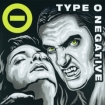"Don't mistake lack of talent for genius."
So reads the slogan on the back of Type O Negative's beloved 1993 album, Bloody Kisses. Punctuated by hardcore screeds like "Kill All the White People" and "We Hate Everyone," the record retained elements of Carnivore and Slow, Deep and Hard. But the infectious goth epics "Black No. 1 (Little Miss Scare-All)" and "Christian Woman" — along with a lush-yet-beefy cover of Seals & Crofts' AM gold staple "Summer Breeze" — pointed the way forward for Type O.
"Me, Peter and Josh wanted to write more melodies," Kenny Hickey says. "We felt anyone could just scream for 70 minutes. So it was a conscious decision to change the music. Not making it less heavy, per se, but making it melodic and not just hardcore screaming. We specifically talked about writing hooks, about making the verses as catchy as the choruses."
Steele explained Type O's new sound in an interview with Michael Moynihan. "Three years have passed since Slow, Deep and Hard and I've been listening to lots of goth, indie and alternative in that time. It's fair to say some of it rubbed off on me."
Though he wasn't in the band yet, Hickey's former Hellraiser bandmate Johnny Kelly was a regular presence in the Type O camp. When the band hauled ass from Brooklyn to L.A. to play a single show with the Cro-Mags, Kelly drove the van. He was around when they started writing the songs that would become Bloody Kisses. "They were working on demos, and I heard Peter crooning," he recalls. "I was like, 'What the fuck?' It was such a departure from what the band had established themselves as, which I thought of as a more refined Carnivore."
"At first, I didn't want to hear crooning," Kelly concedes. "I wanted to hear the guy suffering. But there was a Beatles-type element to it, and to see that kind of musicality being brought into Type O was really cool. And it still had that tongue-in-cheek humor that was so often overlooked. The band was fucking hysterical, but a lot of people missed out on that."
"We all heard the potential," Monte Conner says of the Bloody Kisses demos. "The band had massively evolved into a totally different thing from Slow, Deep and Hard. We knew right away we had something incredible. This band could potentially be the biggest thing Roadrunner's ever put out."
"Black No. 1" was the song that changed everything. When the black-and-white video hit MTV with Steele's fangs front-and-center as goth girls danced around the band, there was no turning back. "She's in love with herself," Steele purred as the unforgettable loping bassline curls through the speakers. "She likes the dark." The camera pulled back to reveal him playing a massive stand-up bass strapped over his shoulder, and that sing-along chorus kicks in: "Loving you was like loving the dead." Cut to Silver playing the Addams Family piano lick, segue into the Sabbath-like break-down. Then Steele produces a knife and pulls a pale woman with dark lipstick into the shadows.
"The video for 'Black No. 1' was definitely a pivotal moment for the band," Hickey says. "It really did take us to another level. It broke us on Headbangers Ball."
"Beavis and Butthead liked it," Kelly points out. "That's what did it — like a year and a half later."
"I was watching MTV Classic the other day, and it came on," Hickey says. "I hadn't seen it in decades. It was like seeing a ghost and then realizing that ghost is you."
Steele was working for the NYC Parks Department when he came up with Type O's biggest hit. "I wrote 'Black No. 1' while I was driving a fucking garbage truck," he told me in a 2008 interview. "I was waiting on line for three hours to dump 40 cubic yards of human waste at the Hamilton Avenue Marine Transfer Station, and I wrote the song in my head. I'm not kidding you. It's about the girl I fucking slashed my wrists over. She was the ultimate goth girl, and I was poking fun at her because she was in love with herself."
Beyond being clever and catchy, "Black No. 1" is a rarity in that it was completely embraced by the very goths that the lyrics make fun of. "One of Peter's favorite bands in the whole world, which he modeled the satirical nature of Type O after, was Devo," Hickey reveals. "That's what Devo was about — making fun of their own fans. They just made folly of humanity, you know? And we had very much a Devo philosophy."
"Black No. 1" was crucial to Type O's success, but it's not Hickey's favorite song on Bloody Kisses. That'd be "Christian Woman," the album's second single. Musically, the song is an unlikely combination of church music and Eighties New Wave. Lyrically, it was inspired by a woman who encouraged Steele to do some cosplay in bed. "She was a Roman Catholic, much as I am," he explained. "But she would get off on breaking the rules a little bit. She would ask me to dress up as a priest and, well, I guess you can just imagine what would happen after that. I guess you could say I have a bit of a priest infection."

"'Black No. 1' was cool and campy, but I was really blown away by 'Christian Woman,'" Hickey says. "I think it's a brilliant piece of music. When you think about each movement of the song, how long it is, and how each movement is great — from the beginning to the verse to the chorus, 'Jesus Christ looks like me,' the whole thing. Peter thought it was the best thing he ever wrote. The album hinged on that song, I thought, even though 'Black No. 1' was the first single."
Together, "Black No. 1" and "Christian Woman" helped make Bloody Kisses a gold — and eventually platinum — record. Given that the 1993 rock landscape was dominated by grunge albums like Nirvana's In Utero, Pearl Jam's Vs. and Smashing Pumpkins' Siamese Dream, it was a massive accomplishment. "When that record came out, there was absolutely nothing like it," Hickey says.
But it was that slogan on the back of the album that summed up Steele's true feelings about Bloody Kisses. "Peter had a knack for slogans, and that was a big part of the self-deprecating nature of Type O," Silver told me in 2011. "We never had expectations of success in any form — and really, we were only moderately successful — but the way I feel we did succeed is that I think we influenced a part of music that not every band gets to: self-awareness. That was our success — not selling a million records. That was Peter's way of saying, 'Hey, we just made this dopey album. You might think it's a work of genius, but guess what? It isn't.'"












